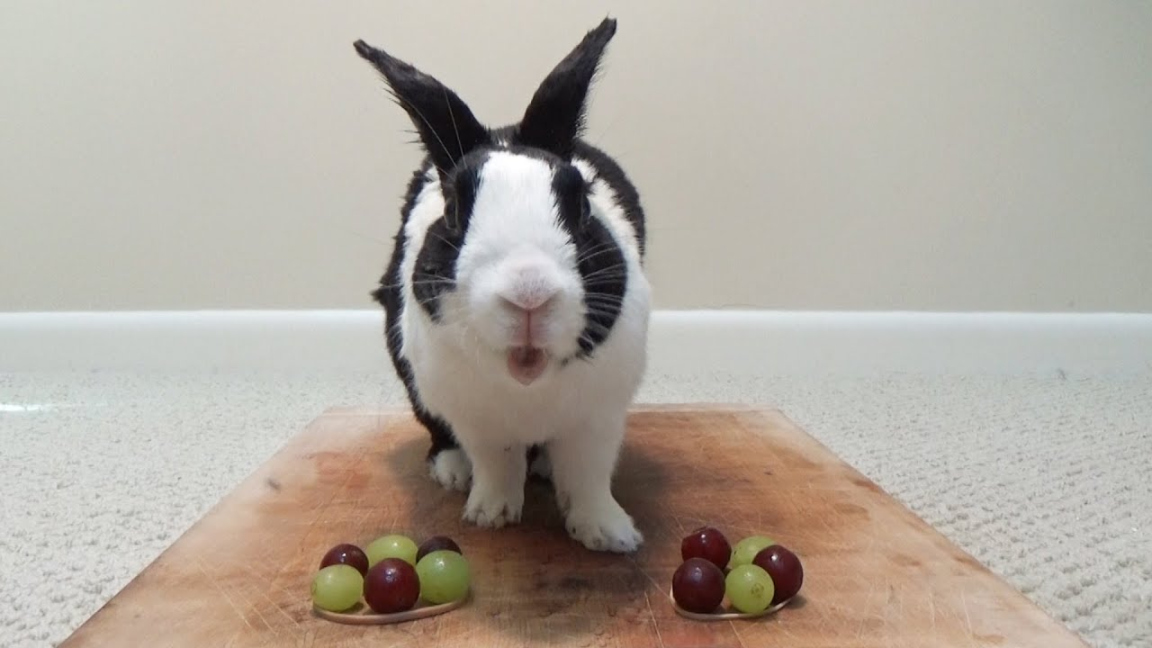Can a Rabbit Eat Grapes?
When it comes to feeding our beloved pet rabbits, it’s important to be cautious about their diet. While rabbits are herbivores and primarily consume hay, fresh vegetables, and some fruits, not all fruits are safe for them to eat. One common question that arises is whether rabbits can eat grapes. Let’s explore this topic further.

The Nutritional Value of Grapes
Grapes are a popular fruit enjoyed by many humans due to their delicious taste and numerous health benefits. They are packed with vitamins and minerals, including vitamin C, vitamin K, and potassium. Grapes also contain antioxidants that help protect against oxidative damage in the body.
Potential Risks of Feeding Grapes to Rabbits
While grapes may be a healthy snack for humans, they can pose risks to rabbits. It’s important to be cautious when introducing grapes into your rabbit’s diet due to the following reasons:
- Choking Hazard: Grapes are small, round fruits that can present a choking hazard to rabbits, especially if they are fed whole. It’s crucial to cut grapes into small, bite-sized pieces to minimize this risk.
- Sugar Content: Grapes contain a relatively high amount of natural sugars. Rabbits have sensitive digestive systems that are not designed to process large quantities of sugar. Excessive sugar intake can lead to digestive issues, such as diarrhea and gastrointestinal stasis.
- Oxalates: Grapes contain oxalates, which are compounds that can contribute to the formation of kidney stones. Rabbits are prone to developing these stones, so it’s best to avoid feeding them foods high in oxalates, including grapes.
Safe Alternatives for Rabbits
Although grapes may not be the best choice for feeding your rabbit, there are plenty of other safe and nutritious options. Consider offering the following fruits and vegetables to your furry friend:
- Leafy Greens: Rabbits love leafy greens such as kale, spinach, and romaine lettuce. These greens are low in sugar and high in fiber, making them a healthy choice for your bunny.
- Carrots: Carrots are a classic favorite of rabbits. They are packed with vitamin A and provide a satisfying crunch for your furry friend.
- Apples: Apples are safe for rabbits to eat, but make sure to remove the seeds and core before offering them. The seeds contain small amounts of cyanide, which can be harmful to rabbits if consumed in large quantities.
- Strawberries: Strawberries can be a tasty treat for rabbits. They are low in sugar and high in vitamin C, providing a nutritional boost.
- Remember: Always introduce new foods gradually and in small quantities to avoid upsetting your rabbit’s delicate digestive system. Monitor their reaction and consult a veterinarian if you have any concerns about their diet.
Frequently Asked Questions about Rabbits and Grapes
1. Can rabbits eat grape leaves?
Yes, rabbits can eat grape leaves. In fact, grape leaves are often included in commercial rabbit food mixes. However, it’s important to ensure that the grape leaves are free from pesticides or other harmful chemicals that could be present on the leaves.
2. Can rabbits eat raisins?
No, it’s not recommended to feed rabbits raisins. Raisins are dried grapes and have a concentrated sugar content, which can lead to digestive issues in rabbits. Stick to fresh fruits and vegetables as treats for your furry friend.
3. How many grapes can rabbits eat?
If you decide to offer grapes to your rabbit, it’s crucial to do so in moderation. One or two small pieces of grape per week should be sufficient. Remember to always cut the grapes into small, manageable pieces to reduce the risk of choking.
4. What should I do if my rabbit accidentally eats grapes?
If your rabbit accidentally consumes grapes, monitor them closely for any signs of distress or digestive issues. If you notice any abnormal behavior, such as a decrease in appetite or changes in bowel movements, it’s best to contact a veterinarian for guidance.
In conclusion, while grapes contain beneficial nutrients for humans, they are not an ideal choice for rabbits due to their choking hazard, high sugar content, and potential contribution to kidney stones. It’s crucial to prioritize your rabbit’s health and provide them with a balanced diet consisting of hay, fresh vegetables, and safe fruits. Remember to consult with a veterinarian for personalized advice regarding your rabbit’s specific dietary needs.
Related Articles…
Copyright Notice:
The images displayed here are sourced from the internet, with copyrights held by respective owners. For removal of any copyrighted image, please email us.